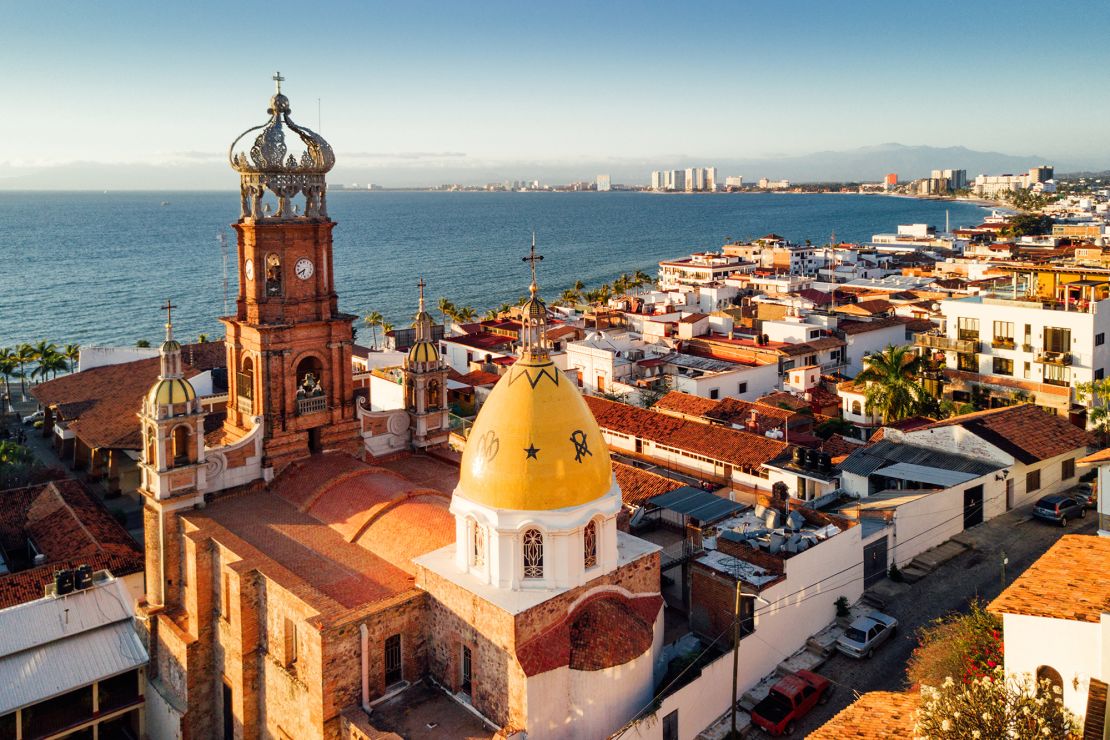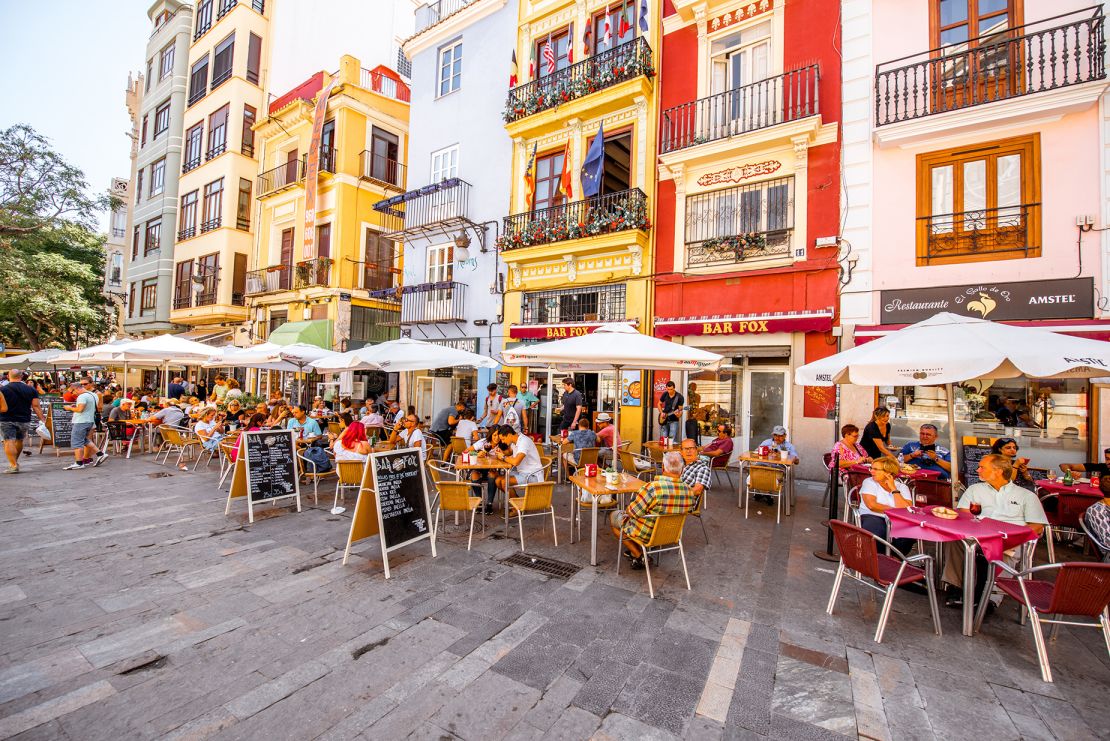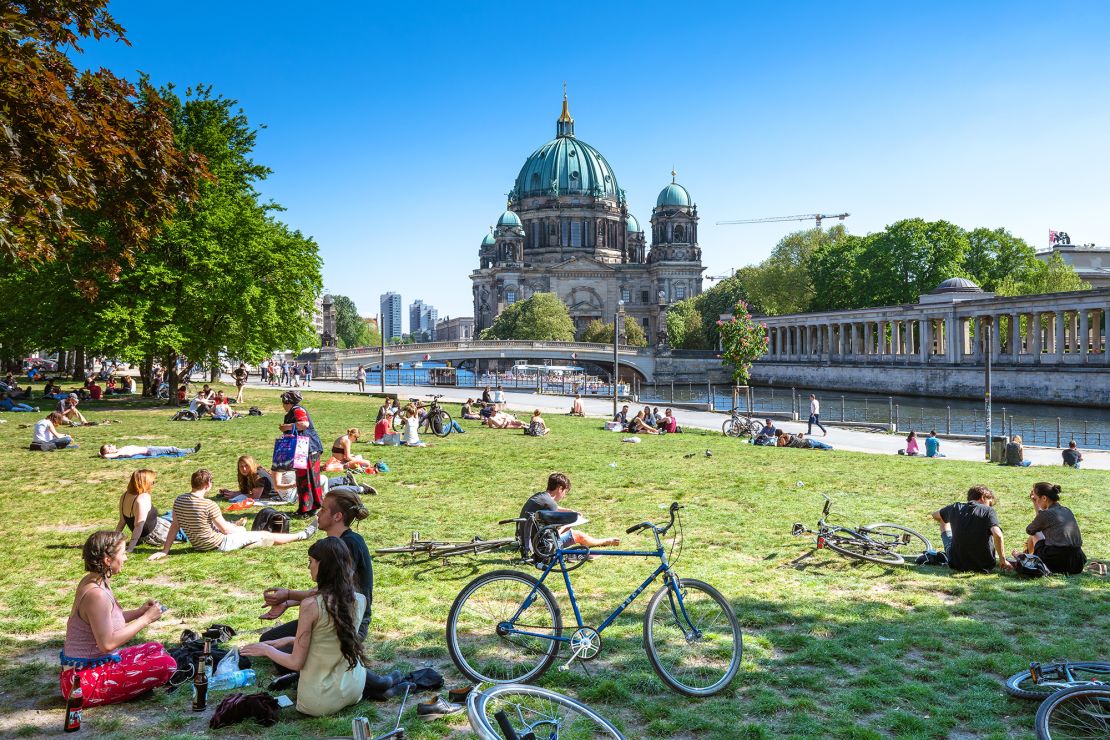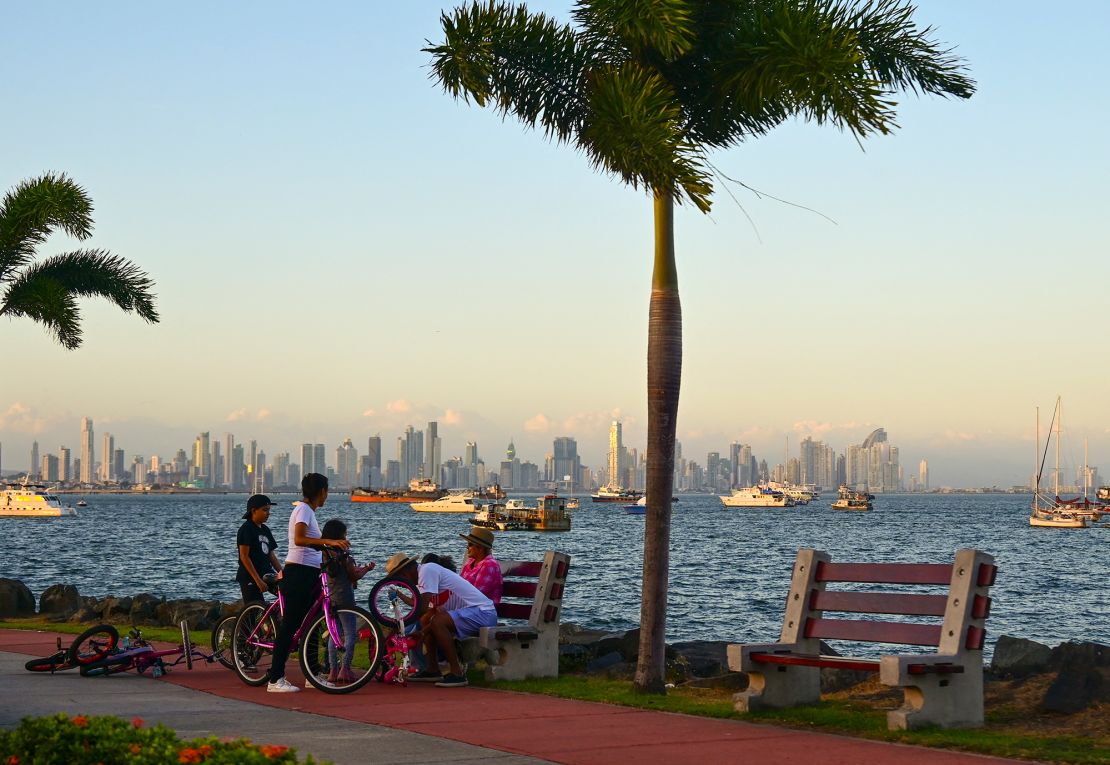Since the US presidential election, there’s been a spike in Americans’ interest in moving abroad.
“It’s been such a gut reaction of, ‘I want to move, but I don’t know where, and I don’t know how,’ ” says Arielle Tucker, a Switzerland-based certified financial planner who specializes in assisting US citizens in moving abroad and says her business has seen a massive uptick in inquiries.Tucker tells CNN Travel, “I think it’s important to always take a step back here and really think about, ‘Well, what countries can I actually move to as an American?’ The harder issue is, if you really want to make that permanent relocation, then you really need to think about, ‘What visa types can I actually get?’ ”
According to Google Trends, searches related to phrases such as “leaving the country” and “how to move to Canada” skyrocketed in November 2024, following the news that Donald Trump would be returning to the White House. It’s been even more than the exponential rise in similar searches after he won the 2016 election. (Back then, Canada’s immigration website crashed.)
Whether or not a move abroad is politically motivated, the increase of remote work, new visa programs and tax incentives that attract digital nomads, investors, retirees and families have as of late provided additional options for people considering an international move.
Of course, the ability to move abroad is a privilege that extends only to people lucky enough to be in possession of the right passport, with doors remaining closed to many nationalities.
Recently, headlines have swirled around the news of several US celebrities moving out of the United States, including Richard Gere, who has publicly discussed his upcoming move to Spain, where his wife is from, and Ellen DeGeneres and her wife, Portia de Rossi, who have reportedly moved to England’s Cotswolds region.
For those who have the option, choosing which country to make your new home is a major decision that requires extensive research and planning. Beyond the “I could live here!” daydreaming that might bubble up during vacation, moving abroad means a deep dive into tax implications, work visas, health care and quality-of-life comparisons, just to name a few.
One helpful resource is the annual Expat Insider survey by InterNations, an expat community with more than 5.4 million members. The survey, which has been running for more than a decade, reflects input from more than 12,500 expats representing 175 nationalities in 174 countries or territories. It conveys their satisfaction level with various aspects of expat life on the basis of factors such as quality of life, ease of settling in, working abroad, personal finance, housing and language.
In addition, retirees can take advantage of resources including Live and Invest Overseas, whose annual index ranks its top 10 overseas retirement destinations. Its 2024 index saw Valencia, Spain, top the list, followed by Braga, Portugal, and Mazatlán, Mexico.
It’s also important to consider the impact of your move on a new host country, especially in destinations that are seeing big upticks in immigration from the United States and other wealthy nations, says Megan Frye, a relocation consultant and writer who has lived in Mexico City for the past nine years.
Frye advises clients considering a move from the United States to Mexico — which has ranked among the top five countries in InterNations’ annual survey since 2014 — to be aware of the inequities in migration policies between the two countries.
“My focus with my clients is to be very clear about the gentrification problem that Mexico faces, and to give them an opportunity to think about what our role is in that situation,” says Frye, who is originally from Michigan. “I believe all people should be able to move freely wherever they want, but there’s a clear injustice considering how easy it is for US citizens to relocate to Mexico in comparison with the other way around.”
While there are dozens of destinations to consider for a move abroad, the following list prioritizes a range of expat-centric topics, including quality of life, affordability, health care, safety and access to culture and outdoor activities. This list offers general advice for people making the move from anywhere in the world, but focuses primarily on US citizens.
Also included are some of the downsides to consider, as well as key info on how to make the move.
Mexico

A popular retirement destination for Americans for decades, Mexico has attracted many more families and the digital nomad set over the past few years.
Mexico City — whose population of 22 million in the metro area makes it North America’s biggest city — has been especially hot as of late. And the capital’s growth shows no signs of slowing, with about 667,300 more inhabitants projected in 2025 than three years prior, according to The World Population Review. From 2019 to 2022, the number of Americans who applied for or renewed residency visas spiked from about 17,800 to more than 30,000.
Elsewhere, cities including Oaxaca, San Miguel de Allende and Playa del Carmen are also havens for US expats, many of whom point to Mexico’s lower cost of living and relaxed lifestyle as strong draws.
Pros: Mexico topped InterNations’ 2023 Expat Insider survey and has ranked among the top five countries since 2014. According to the latest results, expats appreciate factors such as the ease of settling in, a fulfilling social life and strong support networks. Mexico’s affordability and laid-back lifestyle also score high.
Cons: As with other global destinations that have received an influx of Americans as of late, some Mexican cities with large expat communities are getting pushback against foreigners.
Mexico also has a high crime rate. Homicide rates are nearly four times as those in the United States, according to Mexico’s National Institute of Statistics and Geography. And those numbers may be even higher: Data from the Human Rights Watch suggests that an estimated 90% of crimes in Mexico are never reported.
How to make the move: Moving to Mexico isn’t as simple as packing a bag, hopping a flight and toasting to your new life south of the border over a margarita on the beach.
Traditionally, valid passport holders from countries that don’t require a visa (including the United States) who are coming to Mexico for leisure or business have been allowed to remain in the country for up to 180 days. (They still must complete a visitor’s permit, or Forma Migratoria Multiple, FMM for short, at their port of entry.)
However, that 180-day limit is no longer the default, and the exact number of days allowed is at the discretion of the immigration official processing entry.
Mexico does not offer a digital nomad visa, but those considering a permanent move can look into a Temporary Resident Visa, which allows you to remain in the country for up to four years. Meanwhile, retirees can apply for a Permanent Resident Visa.
Spain

A gorgeous climate, a relatively low cost of living, and vibrant, culture-rich cities and towns from the Mediterranean to the Atlantic: No wonder more Americans are eagerly proclaiming “Viva España!” for their next life chapter.
Madrid, Barcelona, Seville and Bilbao all boast large English-speaking expat communities, while the coastal city of Valencia is quickly gaining traction as a coveted spot, too: It ranked first in InterNations’ 2024 Quality of Life Index, and also topped the annual index by Live and Invest Overseas for 2024.
Pros: There’s mucho to love about Spain: modern cities and quaint small towns, high-quality universal health care and a world-renowned dining and nightlife scene, just to name a few benefits. In fact, the Spanish cities of Valencia, Málaga and Alicante ranked in the top three of InterNations’ most recent list of best cities for expats.
According to the International LGBTQ+ Travel Association, Spain also is one of the most culturally liberal and welcoming countries for LGBTQ+ travelers. In 2005, it became one of the first to legalize same-sex marriage, and it hosts one of the world’s largest Pride celebrations, which draws some 1.5 million visitors every year.
Cons: If you’re hoping moving to Spain will boost your career, you may need to adjust your expectations. According to InterNations’ 2023 survey, “Spain performs worst in the Working Abroad Index (34th). Less than half the expats (49%) agree that moving there has improved their career prospects (vs. 59% globally),” and another 36% are unhappy with the local job market.
In addition, English is generally not widely spoken outside of larger cities. And, in the regions of Catalonia and the Basque Country, the official languages are Catalan and Euskara (or Basque), respectively.
The distinctly Spanish way of life also is an adjustment for many, as schedules for working, dining and socializing are later than American standards. The workday generally runs from 9 a.m. to 7 p.m., with a long lunch break during the afternoon siesta (during which time many businesses are closed), and Spaniards usually eat dinner no earlier than around 8:30 p.m.
Politics in Spain is also becoming increasingly more divisive (and occasionally violent), especially as the northeastern region of Catalonia continues its push for independence.
How to make the move: Several options exist for expats, including retirees, looking to relocate to Spain. Anyone with sufficient funds to support themselves and any dependents can consider the non-lucrative visa (or NLV), which is ideal for retirees and those who have other forms of passive income that originates in the United States. (However, you can’t earn income while in Spain with this visa.
Spain also offers a digital nomad visa and an entrepreneur visa. And in November 2024, the Spanish government announced significant changes to its immigration program, including extending its “job-seeking visa” from three months to a full year.
However, recent changes have also made obtaining a digital nomad visa more complicated. Now, applicants must provide additional documentation around their business, such as proof of its existence at least a year prior and proof of ongoing contracts.
The Netherlands

This bicycling-obsessed nation ranked sixth in Gallup’s 2024 World Happiness Report, which assesses various indicators across life satisfaction and social and economic well-being. It also topped Numbeo’s 2023 survey for quality of life.
As of 2022, almost 31,000 immigrants from the Americas lived in the Netherlands, according to official data. The capital of Amsterdam is especially popular, with its picturesque canals, historic architecture and relaxed vibe drawing a large international crowd, but robust expat communities also exist in larger cities such as Rotterdam and Utrecht.
Pros: For active types, it’s hard to beat the Netherlands’ world-class cycling infrastructure and culture – in fact, the country is said to have more bikes (fietsen) than people. The Netherlands also is known for its strong education system, with most education at all levels funded at least in part by the government.
The Netherlands is also increasingly popular among the LGBTQ+ community. In fact, it tops a data-driven list for LGBTQ+ individuals compiled by international insurance provider William Russell, based on various factors such as safety and inclusiveness.
One major tax advantage for foreigners: Highly skilled workers can apply for what’s known as the 30% ruling, a tax advantage in which they’re granted a tax-free 30% allowance of their gross salary for five years. However, in January 2024, the Dutch government implemented a cap on the amount of wages eligible for the ruling.
Cons: Compared with some other European countries, the Netherlands is pricey: Rents for unfurnished apartments hit an all-time high in November 2023, according to data from Statista. Outside main hubs, smaller cities and towns including Haarlem, Delft, Leiden and Maastricht are less expensive.
In addition, income taxes are high, with a tax rate of 49.5% on salaries exceeding €73,031 (roughly $81,135). That can come as quite a shock following five years of enjoying the 30% rule — which leads many expats to start considering their next move after their eligibility ends.
Finally, the weather — gray, chilly and rainy in winter and early spring (which makes biking a lot less enjoyable) and constantly windy (there’s a reason for all those windmills) — can be difficult for some people to handle.
How to make the move: The Netherlands does not offer a digital nomad visa, but you can apply for a long-stay visa, also known as an authorization for temporary stay (in Dutch, it’s MVV for short). Self-employed individuals, meanwhile, can apply for a visa under the Dutch American Friendship Treaty (also known as DAFT).
In the United States, you can apply at the Netherlands embassy in Washington or at the consulates-general in Miami, New York or San Francisco.
Germany

Germany is the European Union’s biggest economy, and its strong job market and robust welfare system — not to mention heritage-rich cities and towns — are appealing for auslanders, especially Americans. According to the latest national figures, more than 122,000 Americans call Germany home. Berlin has an especially large international community of English-speaking internationals, but other hubs such as Munich, Frankfurt and Stuttgart also have strong expat communities.
Pros: Germany is a great fit for families, thanks to universal health care and social benefits such as a monthly kindergeld (“children money”) stipend, heavily subsidized childcare and generous parental leave.
In addition, compared with some other European countries, Germany’s freelancer visa is fairly easy to obtain, Tucker tells CNN Travel. She also notes that “one benefit that US citizens have over some non-EU countries is that they can apply for a Freelance Visa in Germany, as US citizens do not need an entry visa.”
Cons: Germany doesn’t have some of the same conveniences to which many Americans are accustomed, such as 24-hour grocery stores or drive-through pharmacies. On Sundays, most stores are closed (with the general exception of restaurants and bakeries). And the country’s bureaucracy can be maddening, with many government processes relying on official paperwork that’s delivered through the mail.
In addition, Germany’s growing popularity among auslanders has contributed to a housing pinch in major cities, especially Berlin, where finding accommodation is one of the most stressful aspects of a move. And beyond major cities, English is not widely spoken.
How to make the move: Germany’s skilled worker visa allows certain individuals with a qualifying degree or certificate a six-month window to search for employment in their area of qualification. Its self-employment visa is also fairly straightforward.
Costa Rica

Costa Rica’s abundant natural beauty, warm climate and affordable cost of living have for decades appealed to expats looking to immerse themselves in pura vida, which translates to “pure life” and is both the national slogan and lifestyle. The Central American country has long been a popular destination for Americans.
Pros: Costa Rica’s excellent health-care system consistently ranks high. It’s also one of the most sustainable countries in the world, and many locals lead outdoorsy lifestyles, whether that’s surfing year-round or doing daily yoga postures on the beach.
In addition, Costa Rica offers some tax incentives that appeal to foreign nationals. “Costa Rica only taxes income earned in the country, which means that non-Costa Rican pensions, investments or employment income do not incur an additional Costa Rican tax burden,” David Lesperance, founder and principal of Lesperance & Associates, a tax and immigration advisement firm, tells CNN Travel.
Cons: Costa Rica’s laid-back lifestyle also can affect how business is done. For some newcomers, adopting to that slower-paced culture, which spans a concept known as “Tico Time,” referring to the tendency to show up late, can be difficult.
In addition, some creature comforts may be lacking compared with what Americans are used to. In older buildings, for example, it’s not uncommon to throw toilet paper in bins instead of flushing it down the toilet. And thanks to its geography and location along the infamous Ring of Fire, Costa Rica experiences earthquakes, tsunamis and volcanic activity — it’s home to six active volcanoes.
One important note on the tax front: There is no tax treaty between Costa Rica and the United States, so claims on US tax returns for foreign tax credits or foreign earned income are more complicated for expats.
How to make the move: With the country’s digital nomad visa, which was implemented in 2022, remote workers can stay in Costa Rica for up to a year with an option to extend for another year.
Panama

Often described as the Miami of Central America, Panama City is a prominent financial and business hub linking North America and South America. In recent years, the country of Panama has been drawing more Americans beyond just the retirement set.
Lesperance says he’s seen a notable bump in moves among clients with high net worths with Hispanic heritage, as well as workers in the financial sector moving there “en masse,” especially as Miami has become more crowded and expensive.
Pros: Year-round warm weather, a mix of relaxed beach towns and cosmopolitan hubs such as Panama City, and easy access to North America and South America make Panama an excellent option for frequent travelers. And one of the biggest advantages for Panama’s Golden Visa scheme is that it provides perpetual residency without requiring investors to reside there. Maintaining permanent resident status requires a visit to Panama at least every two years.
Cons: In 2023, Panama announced the cost of establishing residence would increase from $300,000 to $500,000. However, following a drop in applications, the country reversed that decision in October 2024, Lesperance said.
“The minimum investment is $300,000 which must be held for at least five years,” he explains. “Investors can qualify via real estate purchases, bank deposits or investing in funds” – even so, that’s a high barrier to entry for many people.
In addition, as with Costa Rica, Panama also does not have a tax treaty with the United States. That makes claims on US tax returns for foreign tax credits or foreign earned income especially complicated, Lesperance notes.
How to do it: Panama offers several types of investment opportunities that offer permanent residency and a path to Panamanian citizenship after five years.
The Panama Qualified Investment Immigration (or PQII) program, often known as the Panama Golden Visa, is a residency-by-investment procedure. The minimum investment remains at $300,000, which must be held for at least five years. Investors can qualify via real estate purchases, bank deposits or investing in funds.
Panama also has a retirement visa program. However, Lesperance notes that although the retirement route technically comes with Panamanian citizenship after five years, “in practice it is not straightforward. Therefore advantages of the PQII pathway versus the cost of a retirement visa are questionable.”
Italy

It’s hard to imagine a country that boasts a more universally romantic notion of living abroad, and thanks in part to the popularity of investment schemes such as the one euro homes that some small towns have launched, expats now have more options of fulfilling their dreams of la dolce vita.
Pros: Access to some of the world’s most popular tourist cities, picturesque countryside and immersion in a culture that values family, food and wine — what’s not to love about Italian life? Italy’s health-care system is also good, and many expats give a big thumbs-up to the overall friendliness of Italians.
Cons: Prospects for employment in Italy aren’t as abundant as in other European countries. Beyond major cities, English generally isn’t widely spoken, and you’ll likely need to hire an attorney to help navigate legal processes such as purchasing a home. And be prepared for Italy’s infamously glacial government bureaucracy.
How to make the move: Americans planning to stay more than three months must get an entrance visa at an Italian consulate before arriving in the country. Italy’s visa options include a long or short-term self-employment visa, or lavorno autonomo, and a start-up visa.
In addition, some Americans opt to try to obtain Italian citizenship through jus sanguinis — or “right to blood” — via descent or ancestry, though the process can be complex and lengthy and require the assistance of a lawyer.
France

While the reality of living in France is drastically different from what’s portrayed in the highly styled scenes of “Emily in Paris,” there’s still plenty to say oui! to: universal health care, highly valued work-life balance (remember all those protests in response to the French government raising the retirement age?) and some of the world’s most coveted food and fashion scenes.
The country also scores well on InterNations’ indexes for quality of life.
Pros: Residents can take advantage of numerous social benefits, including universal health care, economic stability and numerous public holidays — not to mention a 35-hour work week. In addition to the excellent quality of life, from a tax standpoint “because they have some good treaties with the US,” Tucker says. “For example, they are one of the few countries where Roth IRAs are considered qualified retirement accounts and their tax-free nature is preserved. So even though the tax rates are higher, if you can do some pre-immigration planning, it can still be an attractive country for US expats.”
Cons: As Tucker notes, income and social taxes in France are high: up to 45% (and high-income individuals also may need to pay a surcharge of 3% on part of their income).
Outside of major cities such as Paris, Lyon and Strasbourg, the language barrier can be problematic if you don’t have a solid grasp of French.
Singapore

Plenty of foreign nationals are singing Singapore’s praises: In 2022, this sophisticated city-state ranked third on InterNations’ Expat Essentials Index. It’s viewed as one of the top countries in which to live and work, thanks to a thriving job market, excellent education and health care, and one of the world’s best transportation systems.
Pros: Singapore is a top financial and investment hub in Asia, with excellent job prospects and economic stability. Foodies, meanwhile, will love its dazzling dining scene, from lively night markets to Michelin-starred restaurants. And travel enthusiasts can take advantage of easy access to one of the world’s most awarded aviation hubs, Changi Airport.
Cons: Singapore is very expensive, and some people may have trouble adjusting to its humid, tropical climate. It’s also a long way away from the United States, which can be tricky for visits to see loved ones.
How to make the move: Singapore doesn’t offer a digital nomad visa, but those who have work lined up can apply for an Employment Pass. Entrepreneurs interested in starting a business in Singapore can apply for an EntrePass, which has no minimum salary requirement.
Portugal

Portugal’s popularity among expats has exploded since the country introduced its Golden Visa program in 2012. It has become the most successful of its kind, inspiring other countries to launch their own plans to attract foreign investment.
However, in the spring of 2023, Portugal made significant changes to the program, effectively ending the real estate investment aspect. It also changed its non-habitual resident regime, says Alex Ingrim, president and co-founder of Liberty Atlantic Advisors, which specializes in wealth management and tax strategies for US expats.
“Portugal’s a little bit harder of a place to immigrate to [now] if you want the flexibility of a Golden Visa,” Ingrim tells CNN Travel. “It’s not as attractive from a tax jurisdiction standpoint. And we’ve seen a lot of people kind of lose interest in Portugal frankly, and start planning for other jurisdictions in Europe.”
Pros: Portugal is tough to beat for its affordability, quality of life, year-round mild weather and high-quality health-care system. The cost of living is generally more affordable than most countries in Europe (though that’s changing as of late, especially in popular cities such as Lisbon and Porto) and according to Numbeo, the world’s largest crowd-sourced quality of life database, it’s 35.5% lower than in the United States. In addition, Portugal is the seventh-safest country in the world.
Cons: As is the case in Mexico and other countries with large expat communities, there’s growing backlash against the influx of foreigners, especially Americans, and especially in Lisbon. Critics say the resulting spike in rents and real estate prices has forced out longtime residents and changed the fabric of certain neighborhoods.
How to make the move: The Golden Visa program is still in place, although the country has now eliminated the real estate investment option. As Ingrim notes, Americans still interested in pursuing residency via that route “need to be really cognizant of how it affects their financial planning, how it affects their US tax obligations and whether it’s still the best option for them moving forward.”









